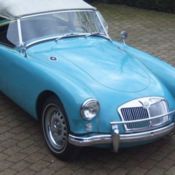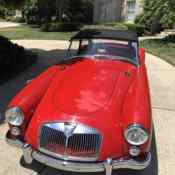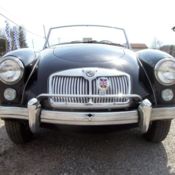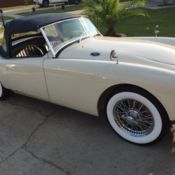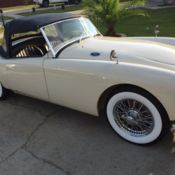1960 MGA MG A TWIN CAM ROADSTER SPECTACULAR CONDITION. EXTREMLY RARE & DESIRABLE
| Make: | MG |
| Model: | Other |
| Type: | Convertible |
| Year: | 1960 |
| Mileage: | 17,230 |
| VIN: | YDH52535 |
| Color: | Blue |
| Cylinders: | 4 |
| Fuel: | Gasoline |
| Transmission: | Manual |
| Interior color: | Gray |
| Vehicle Title: | Clear |
| Item location: | Bremerton, Washington, United States |
| Extras |
| Listed by | Private seller |
Description of 1960 MG Other |
|
1960 MG A TWIN CAM ROADSTER SPECTACULAR CONDITION. EXTREMLY RARE HIGHLY DESIRABLE. VINYHD52535 The MGA is a sports car that was produced by MG from 1955 to 1962. The MGA design dates back to 1951, when MG designer Syd Enever created a streamlined body for George Philips' TD Le Mans car. The problem with this car was the high seating position of the driver because of the limitations of using the TD chassis. A new chassis was designed with the side members further apart and the floor attached to the bottom rather than the top of the frame sections. A prototype was built and shown to the BMC chairman Leonard Lord. He turned down the idea of producing the new car as he had just signed a deal with Donald Healey to produce Austin-Healey cars two weeks before. Falling sales of the traditional MG models caused a change of heart, and the car, initially to be called the UA-series, was brought back. As it was so different from the older MG models it was called the MGA, the "first of a new line" to quote the contemporary advertising. There was also a new engine available, therefore the car did not have the originally intended XPAG unit but was fitted with the BMC corporate B-Series type allowing a lower bonnet line. The MGA convertible had no exterior door handles, however the coupe has door handles.[4] It was a body-on-frame design and used the straight-4 "B series" engine from the MG Magnette saloon driving the rear wheels through a 4-speed gearbox. Suspension was independent with coil springs and wishbones at the front and a rigid axle with semi-elliptic springs at the rear. Steering was by rack and pinion. The car was available with either wire-spoked or steel-disc road wheels. A high-performance Twin-Cam model was added for 1958. It used a high-compression (9.9:1 later 8.3:1) DOHC aluminum cylinder head version of the B-Series engine producing 108 hp (81 kW; 109 PS). Due to detonation problems, a 100 bhp (75 kW; 101 PS) low-compression version was introduced later.[6] Four-wheel disc brakes by Dunlop were fitted, along with Dunlop peg drive knock-off steel wheels similar to wheels used on racing Jaguars, unique to the Twin-Cam and "DeLuxe" MGA 1600 and 1600 MkII roadsters. These wheels and chassis upgrades were used on a small number of the "DeLuxe" models built after Twin-Cam production came to a halt.[7] Aside from the wheels, the only outside identifier was a "Twin-Cam" logo near the vent aside the bonnet. A careful look at the rear wheel vents would also reveal another feature unique to Twin-Cam and DeLuxe: those 4 wheel Dunlop disc brakes mentioned above. Twin-Cam logo next to vent The temperamental engine was notorious for warranty problems during the course of production, and sales dropped quickly. The engine suffered from detonation and burnt oil.[7] Most of the problems with the Twin-Cam engine were rectified with the low-compression version, but by then the damage had been done. Many restored Twin-Cams are running more reliably today than they ever did during production.] The Twin-Cam was dropped in 1960 after 2,111[5] (2,210 according to some[6]) had been produced. Production ended in April 1960, but had slowed to a trickle long before.[6] An open car was tested by The Motor magazine in 1958 and was found to have a top speed of 113 mph (182 km/h), acceleration from 0–60 mph (97 km/h) in 9.1 seconds and a fuel consumption of 27.6 miles per imperial gallon (10.2 L/100 km; 23.0 mpg-US) was recorded. The test car cost £1,283 including taxes of £428.[8] Oddly, an open MGA Twin Cam (Reg. No.PMO 326)road tested by The Autocar magazine and published on 18 July 1958 only recorded a 0-60 time of 13.3secs with the Standing quarter mile of 18.6secs. The mean maximum speed was 113.5 mph, with a best of 114.0 mph. So the explanation must be that either their car was down on power, or that a mistake was made when recording the acceleration figures. This particular Twin Cam Roadster is one of only 19 left hand drive cars made that year! They only made 39 including right hand drive. Engine 1588 CC Trans 4-Speed Color Blue Interior Gray VIN/Serial YDH52535 Mileage 17,230 HIGHLIGHTS Rotisserie restoration Powder coated frame and suspension All chrome re-plated Rebuilt 1588cc/100 HP DOHC 4-cylinder engine Restored 4-wheel disc brakes Restored wheels New wiring and hydraulics Fresh Mineral Blue paint Gray leather interior New British vinyl top and tonneau This is an incredibly beautiful and equally rare motorcar. The condition is superlative and the opportunity for the best bidder to secure a legendary iconic piece of motoring history. Total miles unknown. Please call with questions 206-467-6531. |
 Home
Home Contact us
Contact us NEWEST CARS
NEWEST CARS SELL YOUR CAR
SELL YOUR CAR FAQ
FAQ


